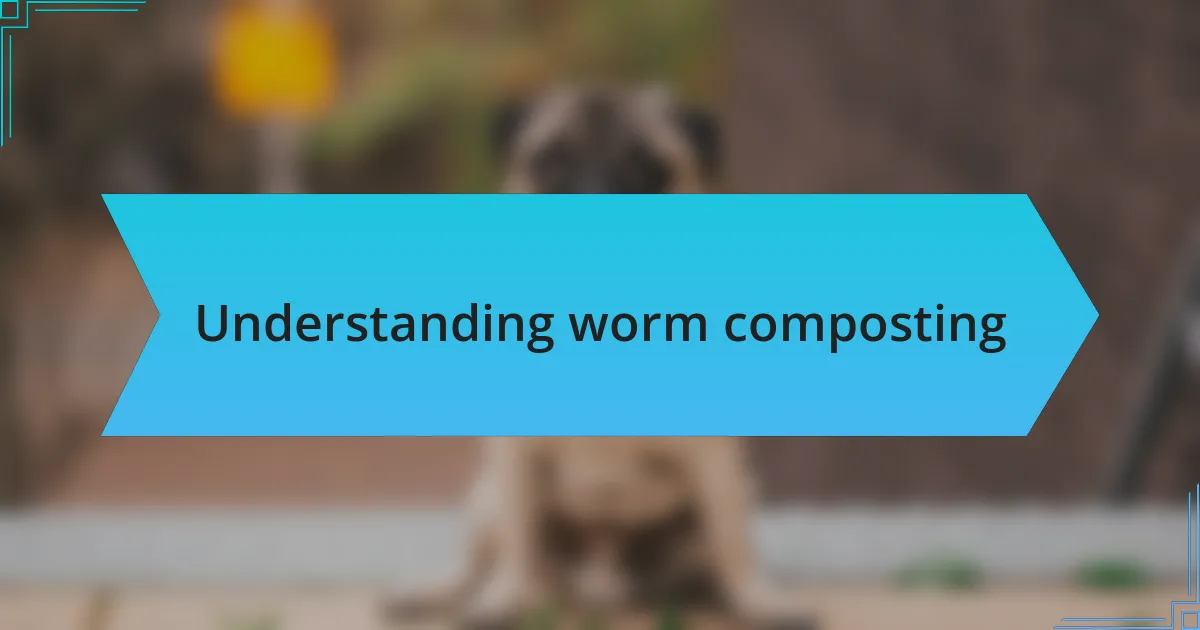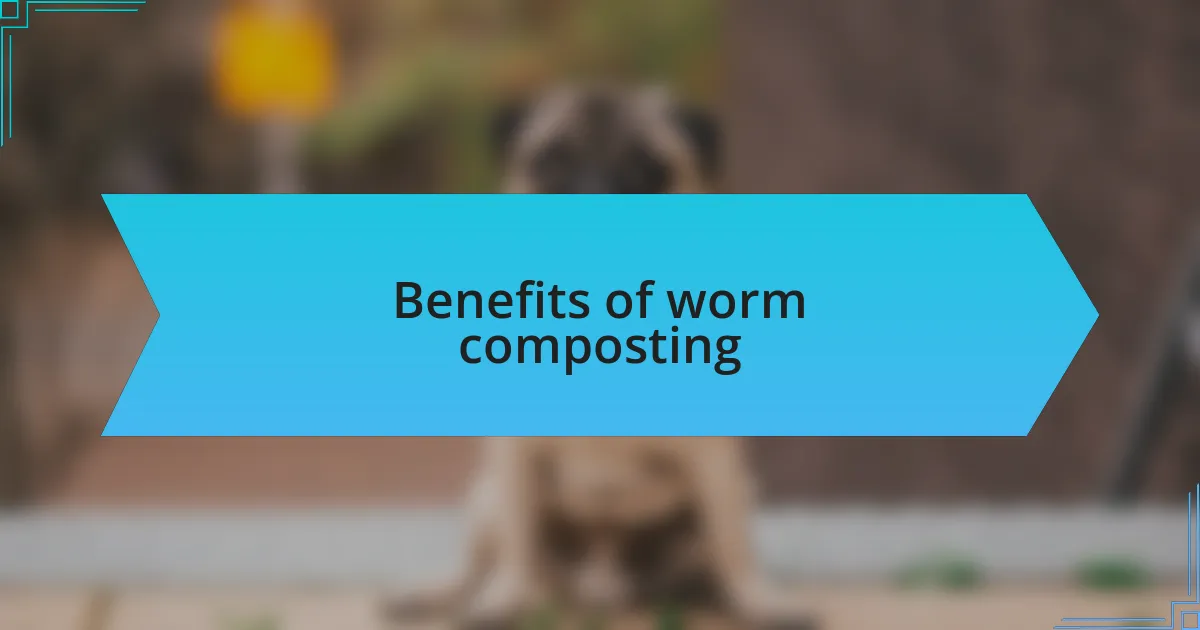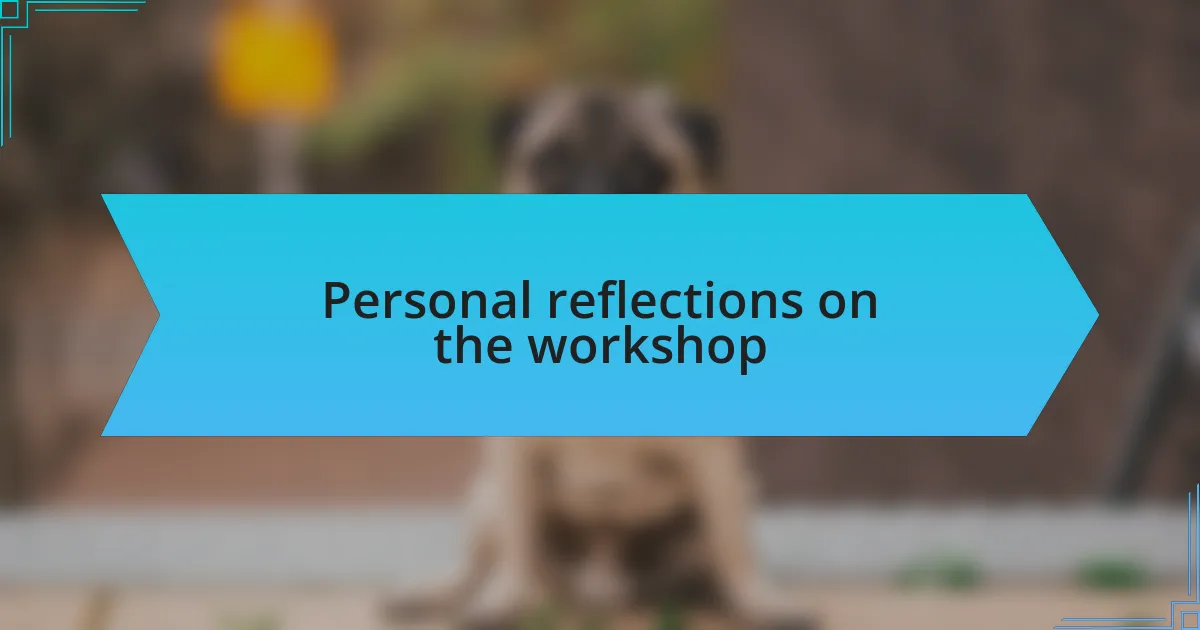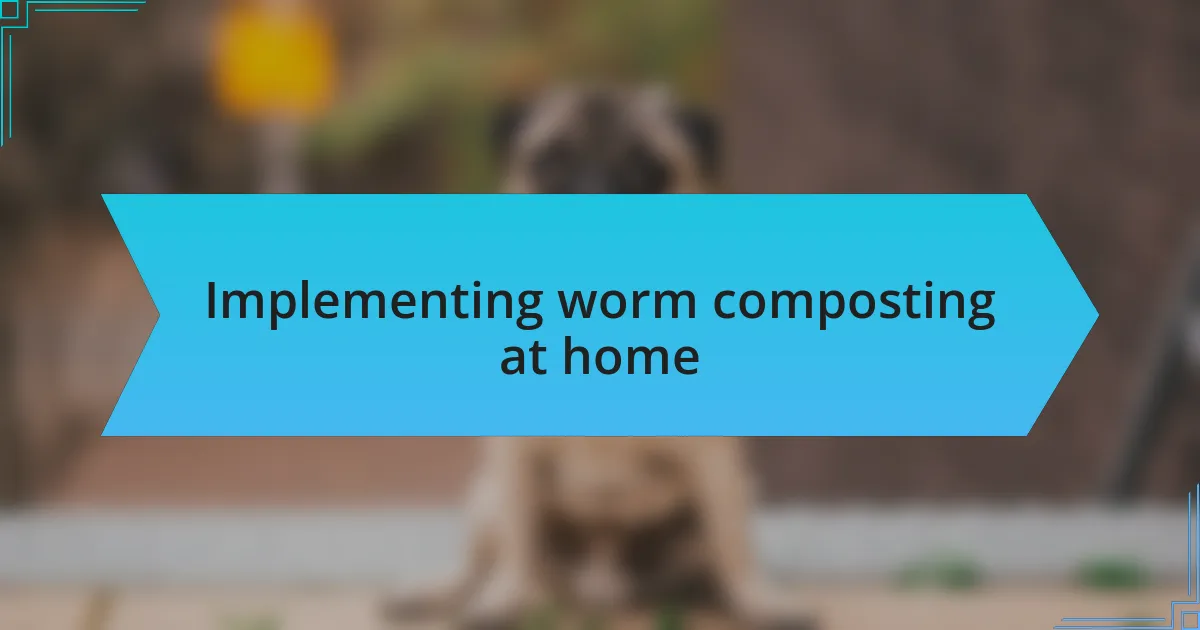Key takeaways:
- Worm composting converts kitchen scraps into nutrient-rich compost, benefiting both waste reduction and soil health.
- Engaging in worm composting can foster environmental responsibility, especially in children, by teaching them about sustainability.
- Personal experiences from workshops reveal the complexities and benefits of worm composting, inspiring individuals to advocate for sustainable practices.
- Implementing a worm composting system at home enhances garden health and encourages a deeper connection with nature.

Understanding worm composting
Worm composting, or vermicomposting, is the process of using specific worms, typically red wigglers, to break down organic waste into nutrient-rich compost. I remember the first time I saw the worms in action; it was both fascinating and a bit surprising. Who knew that such small creatures could be instrumental in transforming kitchen scraps into gold for the garden?
One of the most intriguing aspects of worm composting is how it not only reduces waste but also nurtures the soil. I’ll never forget the moment I dug into my compost bin and felt the difference in texture and aroma from the freshly created worm castings. It made me wonder—a small, seemingly insignificant worm can create such powerful change. Isn’t it amazing how nature’s little workers can turn our discarded materials into life-giving nutrients?
Understanding the balance in worm composting is crucial for success. For instance, I quickly learned that the worms thrive on a diet of fruit and vegetable scraps, but if we add too much at once, it can lead to unpleasant odors. Have you ever experienced that? It’s a gentle reminder that even the best efforts require attention and care, reflecting both our responsibility to the environment and the simple joys of nurturing life through composting.

Benefits of worm composting
Worm composting offers a remarkable array of benefits that extend beyond just reducing kitchen waste. For instance, I still remember how excited I felt when I first discovered that the castings produced by worms are filled with essential nutrients. They improve soil structure and fertility, which is a game changer for any gardener looking to cultivate healthy plants. Can you think of a better way to nurture your garden than using natural, worm-made compost?
Another significant advantage of this practice is its contribution to reducing landfill waste. While attending the workshop, I learned that a single pound of worms can consume about half a pound of organic waste each day. This simple yet effective process can divert thousands of pounds of garbage from landfills every year. Reflecting on my own experience, it made me realize how impactful small changes can be for our environment. Isn’t it incredible how these little creatures help lessen our ecological footprint?
Additionally, worm composting is a fantastic way to engage with children and teach them about sustainability. I recall watching my niece’s eyes light up when she held a small worm in her hand for the first time. It sparked her curiosity about nature and responsibility. Creating a worm bin together became a fun project that not only contributed to our garden but also fostered her appreciation for the environment. What better way to cultivate the next generation of eco-conscious individuals than through the hands-on experience that worm composting provides?

Learning from the workshop experience
Attending the worm composting workshop opened my eyes to the surprising complexities of these tiny creatures. I was fascinated to learn how worms communicate through vibrations and smells, making me appreciate their role in the ecosystem even more. After the workshop, I couldn’t help but marvel at how something so small could have such a profound impact on our environment. Isn’t it amazing how much we can learn from observing the world around us?
One of the most memorable moments for me was watching a demonstration where the instructor used a simple setup to show how worms break down organic materials. It felt almost magical to see how quickly they transformed scraps into rich compost. This experience made me realize the importance of patience in nature; just like nurturing a garden, change takes time but is always rewarding. Can you remember a time when you observed a small act of nature that left you with a sense of wonder?
The discussions around the various types of worms were eye-opening as well. I had no idea that different species could affect compost quality in unique ways. That revelation led me to feel a strong connection to the thriving ecosystem beneath our feet. I left the workshop motivated to share this knowledge with friends, envisioning lively discussions about our roles in sustainability. Who knew a simple workshop could inspire me to become a passionate advocate for these remarkable creatures?

Personal reflections on the workshop
The workshop experience was a surprising reminder of how small actions can lead to significant changes. I remember sitting there, captivated, as the instructor shared stories about individuals who transformed their backyards just by starting a simple compost project. It made me reflect on my own gardening endeavors and how I could integrate these tiny workers into my own routine. Have you ever considered how a little knowledge can reshape your perspective on environmental responsibility?
I also felt a deep sense of connection during the hands-on activities, particularly when I got my hands dirty sifting through compost. It was a tactile awakening; touching the textured materials and noticing the worm’s vital role ignited a passion I didn’t realize I had. The moment I spotted a worm curling to escape my grip reminded me of my childhood curiosity. Have you felt that same childlike wonder when reconnecting with nature?
By the time the workshop wrapped up, I found myself bubbling with enthusiasm. I started thinking about how I could inspire others, much like the instructor inspired me. Sharing this newfound appreciation for worms and their contributions feels like a mission I want to embark on. Isn’t it fascinating how a simple gathering can spark such a profound desire for change within us?

Implementing worm composting at home
Implementing worm composting at home is a wonderful way to not only reduce waste but also enhance your garden’s health. When I first set up my worm bin, I was both excited and slightly anxious. Would the worms thrive? I learned quickly that by providing the right environment—proper moisture, temperature, and a balanced diet of kitchen scraps—I could create an ideal habitat for them. It felt empowering to realize that by making a few small adjustments in my kitchen, I could contribute to a larger ecological cycle.
As I dove deeper into this endeavor, I discovered that worm composting isn’t just about the compost; it’s about fostering a relationship with nature. Each time I fed my worms, I found joy in observing how they turned scraps into rich, black gold. It made me reconsider my waste and the potential it holds. Have you ever thought about how the food you discard can become nourishment for the earth? It’s a beautiful cycle that connects all of us.
The process of harvesting the castings has also been incredibly fulfilling. Unlike throwing food waste into a bin, seeing the results of my efforts sprouting in my garden brought me immense satisfaction. Witnessing my plants thrive, nourished by what once was destined for the landfill, filled me with pride. It’s a gentle reminder of our impact—every small step we take matters. Wouldn’t it be amazing to pass on this knowledge and inspire others in our community to start their own worm composting journey?